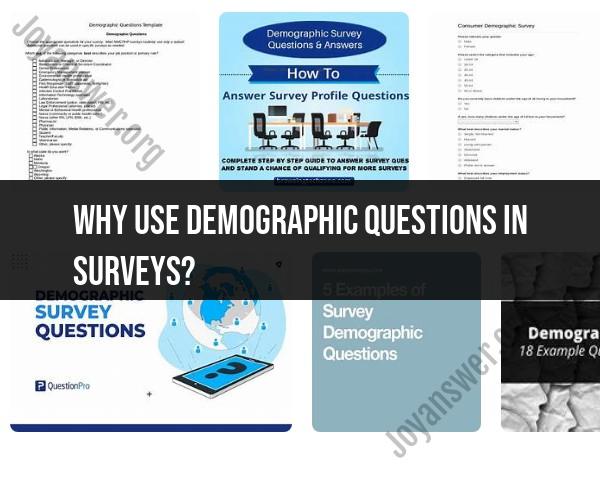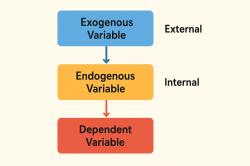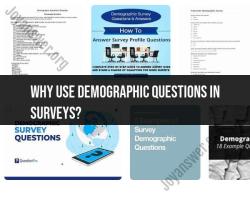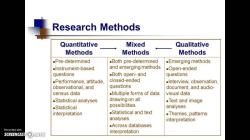Why use demographic questions in surveys?
Demographic questions in surveys collect information about the characteristics of survey respondents. These questions focus on demographic variables, which are traits used to describe populations and segments of society. Incorporating demographic questions in surveys serves several purposes and provides valuable benefits:
1. Segmentation and Targeting:
- Purpose: Demographic information helps segment survey respondents into distinct groups based on common characteristics such as age, gender, income, education, and location.
- Benefits: Segmentation enables researchers and businesses to understand the preferences and behaviors of different demographic groups, allowing for more targeted and personalized communication, products, or services.
2. Understanding the Audience:
- Purpose: Demographic questions provide a snapshot of the survey audience, helping researchers tailor survey content and interpret responses in the context of the participants' backgrounds.
- Benefits: Understanding the demographic makeup of the audience allows for better interpretation of survey results and more informed decision-making.
3. Statistical Analysis:
- Purpose: Demographic variables can be used as independent variables in statistical analyses to identify patterns, trends, or correlations within survey data.
- Benefits: Statistical analysis of demographic data enhances the depth of survey findings, revealing relationships between variables and aiding in the development of insights and recommendations.
4. Benchmarking and Trend Analysis:
- Purpose: Tracking demographic information over time allows organizations to identify changes, trends, and shifts in their target audience or population.
- Benefits: Benchmarking and trend analysis help organizations adapt their strategies to evolving demographics, ensuring continued relevance and effectiveness.
5. Personalization and Customization:
- Purpose: Demographic data facilitates personalized communication, marketing, and product/service customization based on the unique characteristics of different groups.
- Benefits: Personalization increases engagement and resonates more effectively with specific demographic segments, leading to higher response rates and customer satisfaction.
6. Equity and Inclusion:
- Purpose: Demographic questions support efforts to ensure equity, diversity, and inclusion in survey research by identifying underrepresented or marginalized groups.
- Benefits: Recognizing and addressing demographic disparities contributes to fair representation and avoids biases in survey results.
7. Policy and Decision-Making:
- Purpose: Demographic information aids policymakers and decision-makers in understanding the needs and concerns of different demographic groups.
- Benefits: Informed policy decisions that consider diverse perspectives lead to more effective and equitable outcomes for the entire population.
8. Research Validity and Reliability:
- Purpose: Including demographic questions enhances the validity and reliability of survey research by allowing researchers to control for potential confounding variables.
- Benefits: Researchers can ensure that their findings are not solely influenced by a specific demographic characteristic, leading to more robust and credible research.
While demographic questions are valuable, it's crucial to approach their inclusion ethically, respecting respondents' privacy and avoiding questions that may be sensitive or irrelevant to the survey's purpose. Additionally, researchers should be mindful of evolving societal norms and be open to adapting their demographic questions to reflect changing perspectives and identities.
Role of Demographic Questions in Surveys
Demographic questions are crucial for understanding the characteristics of a survey audience and tailoring the survey to better address their needs and interests. By collecting demographic data, researchers and survey creators can:
Identify Target Audiences: Demographic information helps to define and segment target audiences based on factors such as age, gender, education, location, and income level. This allows for more targeted marketing campaigns, product development, and policy decisions.
Tailor Survey Questions: Understanding the demographic makeup of the audience allows for crafting questions that are relevant and engaging for the respondents. This can lead to more accurate and insightful responses.
Analyze Responses: Demographic data can be used to analyze survey responses and identify patterns or trends within specific subgroups. This can reveal differences in opinions, preferences, or behaviors among different demographic groups.
Gain Insights into Specific Demographics: Demographic data provides valuable insights into the characteristics, attitudes, and behaviors of specific demographic groups. This can inform decision-making in various fields, such as education, healthcare, and social services.
Ethical and Responsible Use of Demographic Data
While demographic data is valuable for research and marketing purposes, it is crucial to ensure its ethical and responsible use. Key considerations include:
Privacy Protection: Demographic data must be collected, stored, and used in a manner that protects the privacy of individuals. Consent should be obtained, and data should be anonymized or aggregated to protect individual identities.
Non-discrimination: Demographic data should not be used to discriminate against or unfairly disadvantage individuals or groups. Data should be analyzed and used in a way that promotes equality and fairness.
Transparency and Accountability: The collection and use of demographic data should be transparent and accountable. Individuals should be informed about how their data is being collected, used, and protected.
Data Security: Demographic data should be safeguarded against unauthorized access, misuse, or loss. Proper data security measures should be implemented to protect sensitive information.
By adhering to ethical principles and ensuring responsible data practices, researchers and survey creators can harness the power of demographic data while respecting the privacy and rights of individuals.











